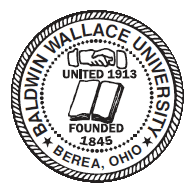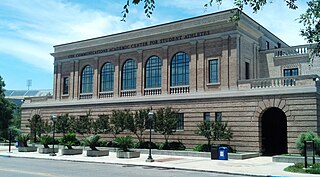
Louisiana Tech University, colloquially referred to as Louisiana Tech or La. Tech, is a public research university in Ruston, Louisiana. It is a space grant college, member of the Southeastern Universities Research Association, member of the Association of Public and Land-Grant Universities, and Carnegie Doctoral University with high research activity (R2). It is a member of the University of Louisiana System.

Roanoke College is a private, coeducational, four-year liberal arts college located in Salem, Virginia, United States, a suburban independent city adjacent to Roanoke, Virginia.

Tulane University is a private, nonsectarian research university in New Orleans, Louisiana, United States. It is the top university and the most selective institution of higher education in the state of Louisiana. The school is known to attract a geographically diverse student body, with 85 percent of undergraduate students coming from over 300 miles away.

Truman State University is a public liberal arts and sciences university located in Kirksville, Missouri, United States. It is a member of the Council of Public Liberal Arts Colleges. It had 6,379 enrolled students in the fall of 2015, with 6,039 undergraduate and 340 postgraduate students, pursuing degrees in 50 undergraduate, and eight graduate programs. The university is named after U.S. President Harry Truman, the only president born in Missouri. From 1972 until 1996, the school was known as Northeast Missouri State University, but the Board of Trustees voted to change the school's name to better reflect its statewide mission. Truman State is the only public institution in Missouri that is officially designated to pursue highly selective admissions standards.

Loyola University New Orleans is a private Jesuit university in New Orleans, Louisiana. Originally established as Loyola College in 1904, the institution was chartered as a university in 1912. It bears the name of the Jesuit founder, Saint Ignatius of Loyola. Loyola is one of 28 member institutions that make up the Association of Jesuit Colleges and Universities and, with its current enrollment of approximately 5000 students, is among the mid-sized Jesuit universities in the United States. Loyola University New Orleans is ranked as the tenth best institution among Southern regional universities offering masters and undergraduate degrees in the 2017 issue of the annual America's Best Colleges issue and guidebook published by U.S. News & World Report. The Princeton Review also features Loyola University New Orleans in the most recent editions of its annual book, The Best 371 Colleges. In the past, the school has been called Loyola of the South, Loyola New Orleans, Loyola University, New Orleans, and Loyola University of New Orleans.

Post University is a private, for-profit university in Waterbury, Connecticut. It was founded in 1890 as Post College. From 1990 to 2004 it was affiliated with Teikyo University in Tokyo, Japan and during that time it was named Teikyo Post University. The university offers over 25 undergraduate and graduate programs in day, evening, and online courses, and has three satellite centers in Meriden, Danbury, and Wallingford. Post was ranked as number 19 in the 2013 U.S. News & World Report rankings of the Best Online Programs report. The Online MBA program was also listed among the top 100 online graduate business programs. In 2015, Post University joined the American Council on Education (ACE) Alternative Credit Consortium to create a flexible education initiative for non-traditional students.

Youngstown State University (YSU) is a public research university in Youngstown, Ohio, United States. Founded in 1908, YSU currently serves over 12,000 students in studies up to the doctoral level. It is affiliated with the University System of Ohio. Currently, it offers more than 170 undergraduate degree programs and over 50 graduate degree programs within its 7 schools and colleges in social science, education, STEM, communication, health, and business. Beyond its current student body, YSU claims more than 94,000 alumni.
Bethel University is a Christian institute of higher education in Tennessee, accredited to bestow degrees to the master's level. Bethel University's main campus is located in McKenzie, Tennessee, with satellite campuses located in Memphis, Nashville, Chattanooga, Jackson, Paris, and Clarksville.

Winona State University (WSU) is a public university located in Winona, Minnesota, United States. Winona State University was founded as Winona Normal School in 1858 and is the oldest member of the Minnesota State Colleges and Universities System. It is notable as the first normal school to be established west of the Mississippi River.

Centre College is a private liberal arts college located in Danville, Kentucky, a community of approximately 16,000 in Boyle County, about 35 miles (55 km) south of Lexington, Kentucky. Centre is an undergraduate four-year institution with an enrollment of approximately 1,400 students. Centre was founded by Presbyterian leaders, and it maintains a loose affiliation with the Presbyterian Church (USA). It was officially chartered by the Kentucky General Assembly in 1819. The college is a member of the Associated Colleges of the South and the Association of Presbyterian Colleges and Universities.

Baldwin Wallace University (BW) is a private Methodist liberal arts university in Berea, Ohio. The university was founded in 1845 as Baldwin Institute by Methodist settlers. Eventually the school merged with nearby German Wallace College in 1913 to become Baldwin–Wallace College. The institution offers a number of undergraduate and several graduate programs.

Louisiana State University of Alexandria is a public university in Alexandria, Louisiana. It offers undergraduate degrees in numerous disciplines. The university is a unit of the LSU System and operates under the auspices of the Louisiana Board of Regents. As of fall 2017, LSUA has an enrollment of 3,378 students which is recorded as the highest in the university's history. The institution is located on the grounds of the former Oakland Plantation some eight miles south of downtown Alexandria. The campus boasts many majestic oaks dating from the nineteenth century.
The main campus of Virginia Tech is located in Blacksburg, Virginia; the central campus is roughly bordered by Prices Fork Road to the northwest, Plantation Drive to the west, Main Street to the east, and U.S. Route 460 bypass to the south, although it also has several thousand acres beyond the central campus. The Virginia Tech campus consists of 130 buildings on approximately 2,600 acres (11 km2).
Barrett, The Honors College at Arizona State University is a program that provides over 5,400 students with a residential experience that is similar to that which one might find at a smaller college or university, while still giving access to the resources of a major research institution. The administration offices for the college are located in Sage Hall in the Barrett Honors Complex, on ASU's Tempe campus, but classes are available at all of the ASU campuses in Arizona.

The E. J. Ourso College of Business is Louisiana State University's business school and was established originally in 1928 as the College of Commerce. It is located in the Louisiana State University Business Education Complex.

The History of Louisiana Tech University began when the Industrial Institute and College of Louisiana was founded in Ruston, Louisiana in 1894. The institute was founded to develop an industrial economy in the state of Louisiana. Four years later, the school was renamed the Louisiana Industrial Institute when Louisiana adopted the Constitution of 1898. When the Constitution of 1921 was passed, the school changed its name again to Louisiana Polytechnic Institute to reflect the school's evolution from a trade school into a larger and broader technical institute. Although the university was informally called Louisiana Tech for about five decades after the 1921 name change, it was not until 1970 when Louisiana Polytechnic Institute officially changed its name to Louisiana Tech University. Over the course of its history, the school grew from a small industrial institute with one building to a university with five colleges and an enrollment of around 11,800 students.

The LSU Cox Communications Academic Center for Student-Athletes, on the campus of Louisiana State University in Baton Rouge, Louisiana, is located in the Gym/Armory building. The building opened in 1930 and was completely renovated and reopened in 2002 to house the Academic Center for Student-Athletes.
The University of Utah Honors College is a public honors college at the University of Utah in Salt Lake City, Utah. Founded in 1962, the Honors College provides liberal arts and science education to top University of Utah students based on a holistic admissions process. Utah Honors graduates have included 31 Goldwater Scholars, 22 Rhodes Scholars, 3 Churchill Scholars, and 23 Truman Scholars, and the program ranks fifth among all public universities in the United States for winning Truman Scholarships. Students admitted to the Honors College complete 24 credit hours of Honors course work, plus an Honors thesis project in their major. Successful students receive an Honors bachelor's degree in their respective fields, the highest undergraduate degree conferred by the University of Utah. The Honors College is located in Fort Douglas and in the Donna Garff Marriott Honors Residential Scholars Community (MHC). The Honors College enrolls approximately 2,300 students from every discipline on campus.























